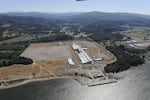Cowlitz County officials sent a letter Wednesday affirming their decision to approve permits for what would be the nation's largest natural gas-to-methanol refinery.
The decision followed an Aug. 30 environmental impact study by the Port of Kalama that determined the proposed southwest Washington facility would help reduce global greenhouse gas emissions by at least 10 million metric tons per year. The company behind the project has said that's roughly the equivalent of taking more than 2 million cars off the road.
"The document contained a thorough evaluation of the full life cycle of GHG emissions from the proposed facility," wrote E. Elaine Placido, Cowlitz County's director of community services.
Placido wrote that the county does not see any "significant unavoidable adverse impacts" with the project and reaffirms its decision to grant shoreline permits for the proposed facility.
The Washington State Department of Ecology has 30 days to approve or deny those permits, or request additional information from the company.
Local environmentalists denounced the county's decision and reaffirmed their opposition to the environmental impact study by Life Cycle Associates, a California-based company NW Innovation Works hired to complete the analysis.
“The Department of Ecology has a really big decision to make," Columbia Riverkeeper conservation director Dan Serres said. "It’s clear to us that this project directly conflicts with the state’s goals for reducing greenhouse gas pollution, for protecting the shorelines and for producing an analysis that’s even in the realm of accurate.”

The site at the Port of Kalama where NW Innovation Works is proposing a 90-acre methanol plant.
NW Innovation Works
NW Innovation Works, the company behind the $1.8 billion project, has said its plant will produce methanol that can be used in the production of plastics, thus reducing global greenhouse gas emissions by offsetting similar production from coal-burning plants in China.
But documents obtained by OPB this year suggested NW Innovation Works may have been misleading state regulators and planning to sell its methanol as fuel in the Chinese transportation market. A move like that would change the calculus of greenhouse gas emissions from the Kalama facility.
Serres said until regulators take emissions from burning fuels into account, the environmental impact studies will remain inaccurate.
"And the Department of Ecology, this is one of the most consequential decisions they’ll make in recent years," he said.
Meanwhile, Cowlitz County said in its letter Wednesday that NW Innovation Works has agreed to develop a voluntary, in-state greenhouse gas mitigation program that exceeds the requirements of the county's shoreline permits.
Washington Gov. Jay Inslee, who initially supported the methanol plant, reversed his position in May and said he could no longer stand behind it.